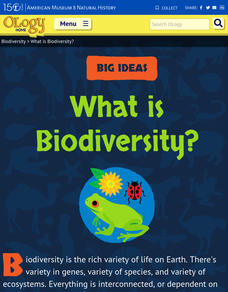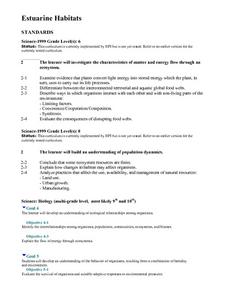Curated OER
Build the Arctic Tundra
Students build a model of biome in order to comprehend the abiotic and biotic factors that are prevalent in a biome. In this hands on building lesson, students use a box to build a biome. . Students decorate the inside and outside of...
Curated OER
The Prairie Climate
Ninth graders research the average temperature and precipitation of a prairie region to determine the type of climate it is, and how it differs from other biomes. They examine the types of adaptions animals have made to live in the...
NOAA
A Laboratory Simulation of Ocean Surface Currents
Stimulate interest in ocean currents with a simulation. The first installment of a five-part middle school series teaches future oceanographers about the forces that interact to cause ocean currents. A simulation shows how wind and the...
Curated OER
Amazon Rainforest
Seventh graders complete a simulation in which they travel through the Amazon rainforest. Using their map skills, they determine the best route and where to see specific plants and animals. They develop their own database to organize...
Curated OER
Mini-Ecosystems
Third graders identify the living and non living things in a book read aloud and discuss the interactions represented in the book. Then, they research and include a list of food that each animal needs in an ecosystem. Finally, 3rd...
Curated OER
Plant Parts
Students use "Kid Pix" to explore plants. In this science and technology lesson plan, students become familiar with plant parts and label them on a plant. Students tell the functions of each of the plant parts.
Curated OER
Planets
In this online interactive planets worksheet, students respond to 9 multiple choice and fill in the blank questions regarding the information included in the provided paragraphs.
Curated OER
One Word Substitution 1
For this online interactive vocabulary skills worksheet, students match the 10 vocabulary terms in the word bank to the appropriate definitions. Students may submit their answers to be scored.
Curated OER
Animals Spiral Puzzle
In this animal puzzle learning exercise, students use a set of 8 clues about animals to complete a spiral puzzle. A reference web site is included for additional activities.
American Museum of Natural History
What's This? Colorful Creatures
An online resource shows learners some species that are very good at using their camouflage as well as other ways species use their coloring for survival. Interactive and digital, the lesson is perfect as a remote learning resource.
American Museum of Natural History
What is Biodiversity?
Not all dogs are the same just like not all finches are the same. An interactive online lesson helps individuals learn about the causes and limitations to biodiversity. The clickable sections describe the basics of the genetics of...
University of Kentucky
Beneficial Bug Scavenger Hunt
Many people think of bugs as annoying pests to be squashed, but most insects and spiders are beneficial, eating the actual pests or pollinating plants. After reviewing some of the common bugs in your area (they may differ from those...
Curated OER
The Bean Growth Experiment
Fifth graders use modern technologies which allow them to gain a new, dynamic, and intersting understanding of themselves, their community, and the world. They focus on environmental education and the effect of the environment on plant...
Curated OER
Where It Comes From: All About Heredity
Characteristics are not only inherited, but can be acquired through interactions with the environment.
Indian Land Tenure Foundation
Relationships to Places
Young historians take a look at how the Indian tribes of California promoted a mindful relationship between people and the land. They begin to understand how the Indians were champions of conservation, and at preserving the natural...
National Park Service
The Water Cycle Game
Take young scientists on a trip through the water cycle with this interactive science activity. After setting up a series of ten stations representing the different places water can be found, children use the included printable dice to...
Cornell University
Classification
Explore the scientific method of classification. An interactive activity asks learners to create a classification system for a group of objects and develop a flow chart to communicate their systems. In addition, individuals use a...
Howard Hughes Medical Institute
Virus Explorer
Most pupils know about the flu, HIV, and other viruses, but they don't know what each actually looks like. This interactive shows their relative size, structure, and allows for comparisons. It stresses the similarities and differences...
Curated OER
This Is Tree-rific!
Third graders view a clip of the video Backyard Safari, "Trees," and portray the life cycle of a tree. They also view a clip on structures of a tree and draw a diagram of a tree in their science journals.
Curated OER
Estuarine Habitats
Sixth graders study the important habitats, flora, fauna, and physical factors of coastal habitats. They compare the aquatic habitats to terrestrial habitats by researching and completing tables with the information.
Curated OER
Food Chains
Students investigate how food chains work. In this food chains lesson, students construct a food web for a pear tree habitat. The interactive whiteboard is an optional tool in this lesson.
Curated OER
What Parts Are There to a Plant?
Learners explore botany by completing plant science worksheets. In this plant anatomy lesson, students examine real vegetables in class using magnifying glasses. Learners identify the plants anatomy and complete worksheets discussing...
Curated OER
Animal Masks
Learners design and make animal masks. In this research and application lesson, students use a computer to research what a panther eats, select an animal mask they want to make and then use the materials provided to create their...
Alabama Learning Exchange
Botany Scavenger Hunt Where's the Ginkgo?
Learners use a science journal to log plants that are native to Alabama. In this plant lesson plan, learners identify characteristics, describe environments, and classify the plants that they find.

























